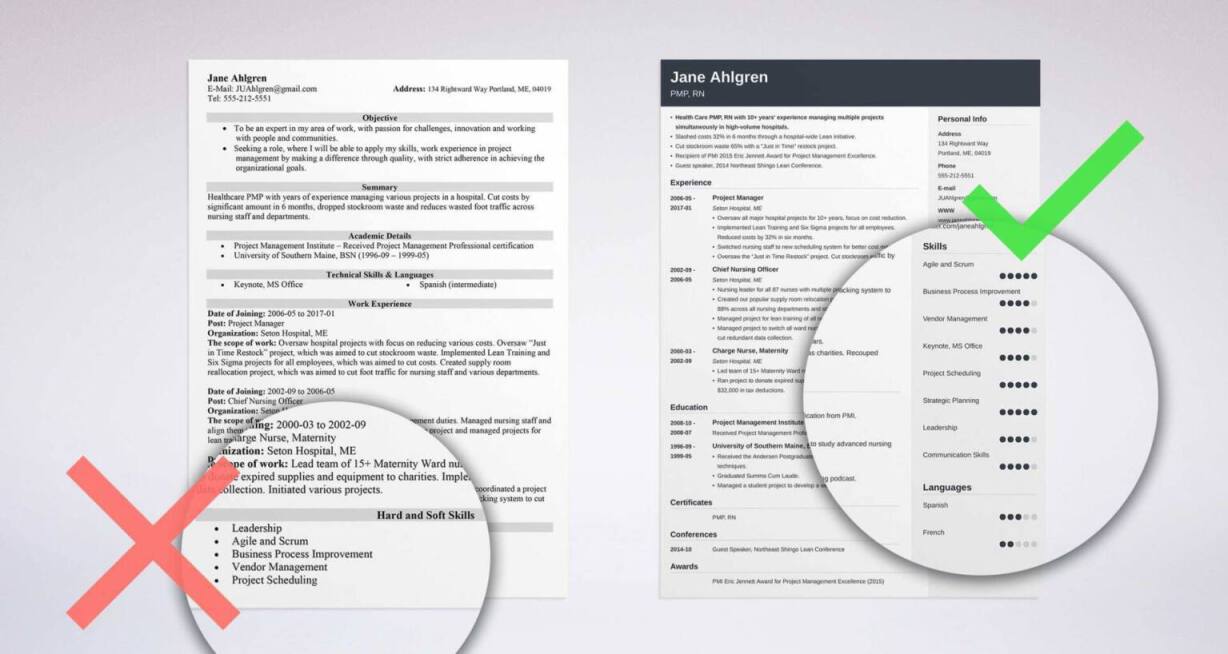:max_bytes(150000):strip_icc():saturation(0.2):brightness(10):contrast(5)/adult-man-looking-over-papers-185262103-57a8b6e43df78cf4591f10e0.jpg)
A technical writer is responsible for creating FAQs, charts, images, and training documents that can be easily understood by people in a wide range of backgrounds.
Be Ready to Provide Samples: For some positions, you may be asked to submit writing samples in place of or in addition to a cover letter. Choose those projects and writing samples that are most relevant to the client’s project.
Be sure to list software programs relevant to the job description on your resume, especially if the description specifically states that they are a requirement.
A technical writer must have strong communication skills, along with exceptional writing and grammar skills. A bachelor’s degree in Journalism, English, or Communications is often required. However, some companies require a degree and/or knowledge in a specialized field, like computer science, engineering, or finance.
Technical Writer Skills
Sometimes writing and editing is done by a team (some writing and some editing) or by one person.
Some clients require the use of certain word processing programs, file sharing services, collaboration apps, blogging platforms, or website templates. Projects may also require other types of software, such as spreadsheets or video editing. The more of these you already know how to use, the better.
Written language skills are an integral part of many positions in almost every industry. Even staff positions and freelance opportunities that center around writing or editing skills can occur in multiple fields that don’t overlap.
Most people in the United States can write, but few can write well. Not all professionals understand the nuance of words, syntax, and style to properly hand out complex ideas in digestible ways for readers from various walks of life.

- Revised 150+ business documents , including company reports and newsletters.
- Proofread 200+ MS Word documents for accuracy with 99.9% error-free results.
First, tailor your resume by picking the writer skills shown in the job ad . Those are the ones the employer cares about.
- Used technical writin g skills to produce 50+ executive-level briefings per year . Commended 5x by management for brevity and accuracy.
- Created documentation for 153 software solutions. Used in-depth product knowledge to save 5 hours per week for engineers.
Does that fat job want business writing skills? You’ll need to prove them, but first make sure you’re proving the right skills.
Business Writing Skills Examples for Resumes

Here’s the most useful writing skills guide this side of Malcolm Forbes.
Do you need to prove essential writing skills for college and beyond? Try to find the specific skills they want.
Pro Tip: Spelling and punctuation in a resume must be flawless. Nothing says, “I’m not a good writer” like sloppy resume writing—this is one of the worst resume mistakes.
[I used] a nice template I found on Zety. My resume is now one page long, not three. With the same stuff.

Nothing is worse than having to send emails back and forth all day trying to clarify the details. Give readers everything they need so they don’t have to email back asking for more info. Nothing will alienate a potential client — or coworker — more than sending something that’s far too general to be useful.
Sometimes, sending a message or an email isn’t the best way to get in touch. It might be better to pick up the phone, set up a video chat or meet up in person. Keep this in mind when you’re about to send a message. Is this message best sent via writing, or should it be delivered face to face?
You’d be surprised at how many professionals skip this step — at a cost. No matter what you’re writing, ensure that it’s properly proofread and edited before it’s sent. Even a single letter in the wrong place in the wrong word can lead to embarrassment later. Spell check won’t catch everything, so make sure you read your writing carefully.
Here are eight tips on how you can improve your business writing skills, no matter your position.
5. Be Detailed From the Get-Go
From communicating with potential clients via your newsletter to sending an email to your boss to composing a company-wide report, most professional communication is done via the written word, so it’s absolutely essential that your writing skills are up to snuff.
Once you’ve completed a draft, ask yourself, “How could this be misunderstood?” Take a step back from your writing and read it from the audience’s point of view. Look for words with multiple meanings and replace them with more precise alternatives. If you’re describing a process, use sequencing and transition words, like “first,” “second” or “next,” to help your reader follow along. Double check your work and make your writing as clear as possible.
Even if “writer” isn’t mentioned anywhere in your job description, the ability to write well can be a big boost to your career.
It’s always worth getting help with your writing, and plenty of online tools offer help. Give these a try:
- Easy Word Counter: Use this tool to check the length of your writing.
- State Of Writing: This site is full of helpful writing guides.
- Grammarly: This browser extension helps you with grammar and spelling in everything from WordPress to email. It also sends you a weekly report of your progress.
- Cite It In: Use this tool to cite your sources correctly.

_______ is able to blend short words using the vowel(s) _____ without assistance.
_______ can write an original story containing two to four sentences.
_______ has difficulty remembering the spelling of non-phonetic words.
_______ has shown a great amount of improvement with her creative writing. She has learned to use more colorful words.
Comments for Students' Report Cards
_______ is making excellent progress reading sight words. Please continue to practice with him nightly.
_______ needs to increase his speed and comprehension in reading.
_______'s reading has improved considerably throughout the year. Please continue to practice reading with her nightly.
_______ now knows and is able to use _____ consonant and vowel sounds.

Remember, your reports are the direct representation of your service to your client.
At first, make corrections yourself and go through the editing process to show officers what needs to improve. After a few times of that, give them the opportunity to correct their mistakes themselves to see if they can fix it on their own. With enough repetition and time spent going over the right way to write a report, they should be able to take care of the process on their own.
Training is important, but it’s also time-intensive. You can take a lot of time off that training and start seeing reports improve faster by utilizing some simple tools. For instance, there are plenty of free apps and websites out there you can give officers that continue to struggle with spelling and grammar. Here are a few examples:
We had a customer recently that frequently had to deal with vagrants. These incidents can get intense very quickly, which makes reporting incredibly difficult. The emotions can cloud an officer’s memory, it’s hard to report a conversation with foul language, and with police often getting involved it’s extra important to get an accurate report.
Show Examples of Quality Reports
Officer reports can contain some recurring mistakes that frustrate security company owners and supervisors to no end. Whether it’s sloppy handwriting, poor grammar and spelling, or missing information, a bad report makes clients think you lack professionalism and can result in angry phone calls to clarify miscommunication.
“When you let them know why, they will start to feel like a more integral part of your business,” said Johnny on today’s episode.
This customer had been using body cameras, which are expensive and obviously make guards extremely uncomfortable. We showed their guards how to use audio files to make reports clear and understandable. On first contact, the guard selects the location and records himself stating the details of situation. Then, he can record his conversation with the vagrant, with the property manager, and with any police officer that arrives on the scene.
